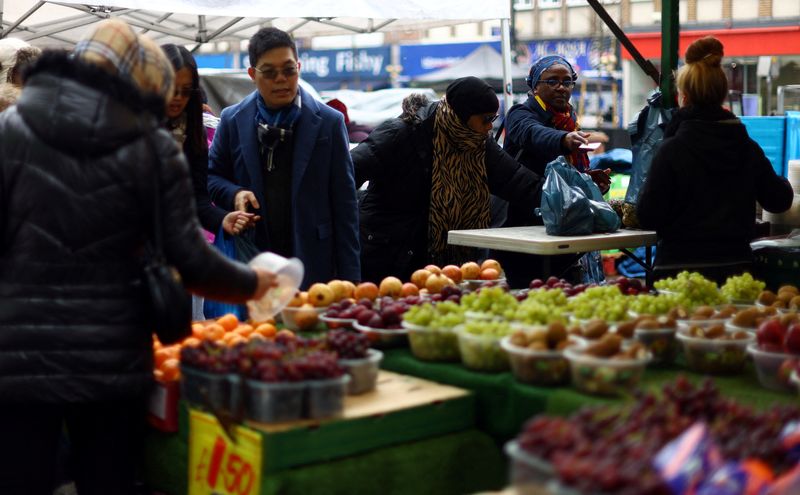By David Milliken and William Schomberg
LONDON (Reuters) - British inflation unexpectedly rose to 10.4% in February, pushed up by higher food and drink prices in pubs and restaurants, according to official data which is likely to prompt the Bank of England to raise interest rates on Thursday.
Economists polled by Reuters had forecast that the annual consumer price inflation rate would drop to 9.9% in February from January's 10.1% and move further away from October's 41-year high of 11.1%.
The figures - including increases in underlying inflation measures that the BoE closely monitors - are likely to bolster the concerns of those BoE policymakers who worry that inflation will be slow to fall, even after 10 straight rate hikes.
Investors had been split on whether the central bank would pause that run after the recent upheaval in the global banking sector. But financial markets on Wednesday fully priced in a quarter-point increase to 4.25%.
"While the decision has at times over the last week looked to be on a knife edge, this inflation outturn would appear to swing it in favour of a 25-basis-point hike," said Liz Martins, senior economist at HSBC (LON:HSBA).
Sterling rose against the dollar and the euro after the data was published and two-year British government bond yields, which are sensitive to speculation about interest rates, jumped.
The increase in inflation contrasted with a fall in the U.S. CPI rate to 6.0% in the 12 months to February. Euro zone inflation also eased last month to 8.5% but underlying price growth continued to accelerate.
The ONS said that an end to January drinks promotions in pubs and restaurants was the biggest factor behind last month's rise, but shortages of salad items also played a role.
Overall inflation for food and non-alcoholic drinks rose to 18.0%, the highest since 1977, reflecting cold weather in southern Europe and north Africa, as well as reduced production from greenhouses in northern Europe that face high energy bills.
Higher alcoholic drink prices added 0.17 percentage points to February's inflation rate while the increased cost of food and non-alcoholic beverages added 0.15 percentage points. Lower petrol prices helped offset some of these increases.
GRAPHIC - Unexpected jump in UK inflation: https://www.reuters.com/graphics/BRITAIN-ECONOMY/INFLATION/lgpdkjjlovo/chart.png
UNDERLYING INFLATION UP TOO
Annual inflation in the services sector, which most policymakers view as a good measure of underlying price pressures in the economy, rose to 6.6% from 6.0% in January.
Basic wages - a big driver of services prices - rose by an annual 6.5% in the three months to January, and a survey of employers on Wednesday showed they expected to raise pay by an average of 5% this year, around double pre-pandemic rates.
Core CPI - which excludes energy, food, alcohol and tobacco and is also watched closed by the BoE - rose to 6.2% from 5.8% in January, versus a forecast decline to 5.7%.
"These inflation figures smell a little like the recent U.S. experience, where it appeared that core inflation was easing rapidly a few months ago only for it to accelerate again as economic activity proved resilient," said Paul Dales, chief UK economist at Capital Economics.
However, other analysts said the increase in inflation appeared to be caused by one-off factors.
Last month, the BoE forecast headline inflation would drop below 4% by the end of 2023 and be beneath its 2% target from mid-2024 onwards, with energy prices no longer rising steeply.
The government's Office for Budget Responsibility forecast last week that inflation would fall below 3% by the end of 2023.
Some BoE policymakers have said they had tightened enough and the full impact of past rate rises had yet to be felt.
Finance minister Jeremy Hunt said the data showed the expected decline in inflation could not be taken for granted.
"Falling inflation isn't inevitable, so we need to stick to our plan to halve it this year," he said.
On Tuesday, he told lawmakers that inflation above 10% was "dangerously high".
There were some signs of decreasing price pressures ahead.
Prices paid by factories increased by 12.7% over the 12 months to February, still a big rise by historical standards but their weakest increase since September 2021. Prices charged by manufacturers rose at their weakest pace in a year, up by 12.1%.
